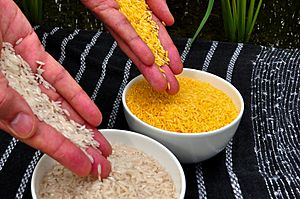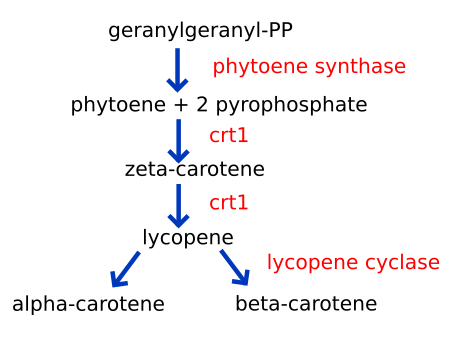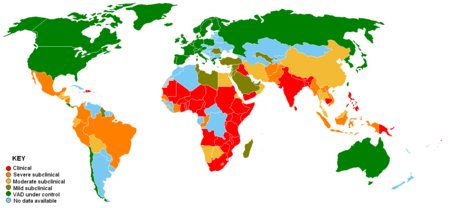Golden rice facts for kids
Quick facts for kids Golden rice |
|
|---|---|

Golden rice (right) compared to white rice (left)
|
|
| Species | Oryza sativa |
| Cultivar | Golden rice |
| Origin | Rockefeller Foundation |
Golden Rice is a special type of rice that scientists created using genetic engineering. This rice can make beta-carotene, which your body turns into vitamin A. It's meant to help people in places where many don't get enough vitamin A from their food.
Not getting enough vitamin A can cause serious eye problems, like not being able to see well at night. It can even lead to permanent blindness. It also makes children more likely to get sick from diseases like measles and diarrhea. In 2013, many people in Africa and South Asia didn't have enough vitamin A.
Even though some groups don't like genetically modified foods, over 100 Nobel Prize winners in 2016 supported Golden Rice. They said it could make much more beta-carotene than regular rice.
Contents
The Story of Golden Rice
The idea for Golden Rice started in 1982 with the Rockefeller Foundation. Scientists wanted to find a way to help people get enough vitamin A.
In the 1990s, a scientist named Peter Bramley found a way to make plants produce beta-carotene more easily. Later, in 2000, scientists Ingo Potrykus and Peter Beyer shared the full details of how they made Golden Rice. This was after eight years of hard work.
The first tests of Golden Rice in fields happened in 2004 at Louisiana State University. More tests were done in the Philippines, Taiwan, and Bangladesh. These tests showed that Golden Rice grown in fields made 4 to 5 times more beta-carotene than rice grown in a greenhouse.
Newer Versions of Golden Rice
By 2018, scientists were working to make Golden Rice versions of local rice types. This means the new Golden Rice would still grow well, resist pests, and have the same grain quality as the rice farmers already use. The goal is for Golden Rice seeds to cost farmers the same as other rice seeds.
Official Approvals
In 2018, both Canada and the United States said Golden Rice was safe to eat. Health Canada and the US Food and Drug Administration (FDA) checked it carefully. Health Canada also said Golden Rice would not cause allergies.
In 2019, the Philippines approved Golden Rice for people and animals to eat. Then, on July 21, 2021, the Philippines became the first country to officially allow farmers to grow Golden Rice for sale. This was a big step for genetically engineered rice in Asia.
How Golden Rice Is Made
Golden Rice was made by adding two special genes to regular rice:
- One gene, called psy, comes from daffodil flowers.
- The other gene, called crtI, comes from a soil bacterium.
These genes are put into the rice so they only work in the part of the rice grain that we eat. The genes help the rice make lycopene, which is a red color. But then, the rice's own natural tools turn the lycopene into beta-carotene. This gives Golden Rice its special yellow color. The first Golden Rice made a small amount of beta-carotene.
Golden Rice 2
In 2005, another group of scientists created Golden Rice 2. They used a gene from corn that is very good at making beta-carotene. Golden Rice 2 makes 23 times more beta-carotene than the first Golden Rice. This new version is much better at helping people get enough vitamin A.
Why Vitamin A Is So Important
The main reason Golden Rice was developed was to help children who don't get enough vitamin A. Many children around the world suffer from this problem. In 2012, the World Health Organization said that about 250 million young children had vitamin A deficiency. Giving these children vitamin A could save millions of lives.
Between 1990 and 2013, many studies showed that giving children vitamin A supplements could greatly reduce sickness and death. As of 2017, over 80 countries give vitamin A supplements to young children twice a year. These supplements are a simple and cheap way to help children stay healthy.
Many children in countries with vitamin A problems eat a lot of rice. So, making rice that produces vitamin A seemed like a simple and cheaper way to help. It could be an alternative to giving out vitamin supplements all the time. One bowl of the newest Golden Rice can give a healthy child about 60% of the vitamin A they need each day.
It's important to remember that your body needs some fat to use the beta-carotene from Golden Rice. This is because beta-carotene is hydrophobic, meaning it doesn't mix well with water.
Research and Safety
Studies on Golden Rice
In 2009, a study with adults in the US showed that the beta-carotene from Golden Rice turns into vitamin A in people's bodies. The study suggested that eating just one cup of Golden Rice daily could provide half of the vitamin A an adult needs. Beta-carotene is found in many healthy foods like fruits and vegetables and is a safe source of vitamin A.
In 2012, another study found that beta-carotene from Golden Rice was just as good as beta-carotene in oil for giving vitamin A to children. However, this study was later removed from the journal because some researchers gave Golden Rice to Chinese children without their parents' full permission.
More recent studies suggest that Golden Rice can help improve vitamin A levels in women and children. Scientists have also checked Golden Rice very carefully. They found that it is as safe to eat as regular rice.
Sharing Golden Rice
Scientists suggested that Golden Rice should be given for free to farmers who grow food mainly for themselves. Because Golden Rice got a lot of good attention, especially in Time magazine in 2000, free licenses were quickly given to developing countries. Even big companies like Monsanto Company allowed their related patents to be used for free.
Farmers who make less than $10,000 a year from Golden Rice do not have to pay any fees. Also, farmers are allowed to keep and replant the seeds from their harvest.
Images for kids
-
A simplified overview of the carotenoid biosynthesis pathway in golden rice. The enzymes expressed in the endosperm of golden rice, shown in red, catalyse the biosyntheis of beta-carotene from geranylgeranyl diphosphate. Beta-carotene is assumed to be converted to retinal and subsequently retinol (vitamin A) in the animal gut
pt:Arroz#Arroz dourado
See also
 In Spanish: Arroz dorado para niños
In Spanish: Arroz dorado para niños






